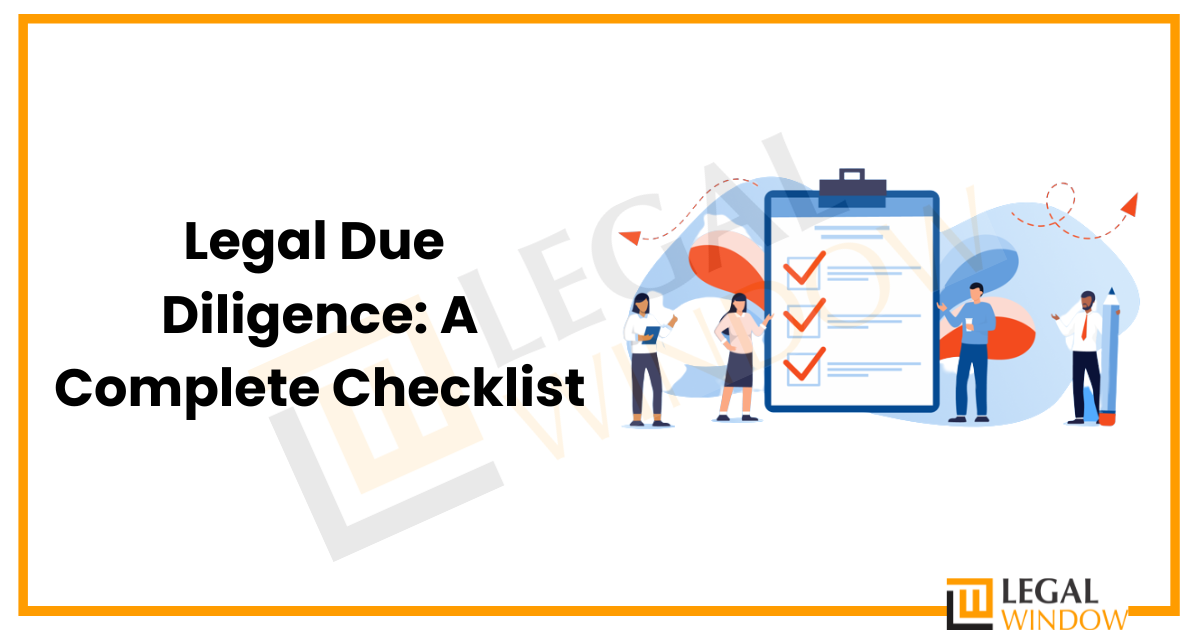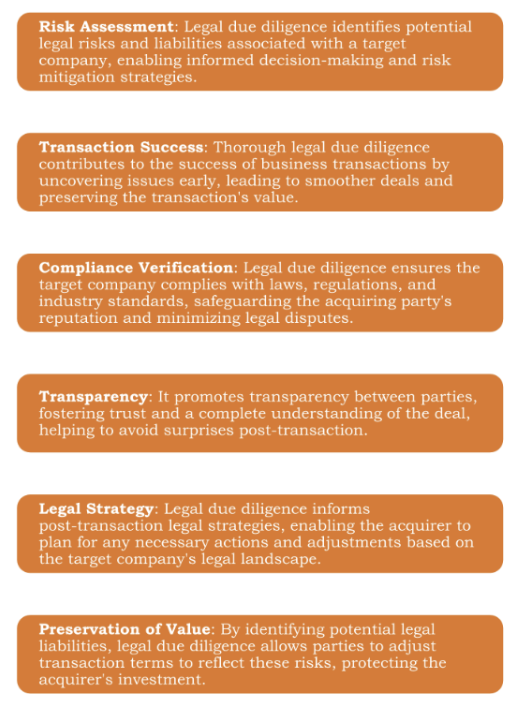
How do businesses ensure their investments and transactions are secure from legal risks? Enter "Legal Diligence Checklist." This essential tool serves as a comprehensive guide to understanding and mitigating potential legal pitfalls in various business dealings. From contracts to compliance, intellectual property to litigation history, this checklist equips individuals and companies with the necessary insights to make informed decisions and navigate the complex legal landscape with confidence. In this article, we will discuss the checklist for legal due diligence (Legal DD).
| Table of Contents |
What is Legal Due Diligence?
Legal due diligence is a critical process in various business transactions, such as mergers and acquisitions, investments, partnerships, and other significant agreements. It involves a comprehensive review and analysis of legal documents, contracts, licenses, intellectual property, litigation, regulatory compliance, and other legal aspects of a company. This process aims to identify potential legal risks and liabilities that could impact the transaction or the overall business. A well-executed legal due diligence process can help parties make informed decisions, mitigate risks, and ensure the smooth execution of the deal.
Objectives of Legal Due Diligence
The objectives of the Legal DD Checklist are as follows-
- Risk Identification: One of the primary objectives of legal due diligence is to identify and assess potential legal risks and liabilities associated with the target company. This includes identifying any ongoing or potential litigation, regulatory compliance issues, contractual obligations, and other legal matters that could impact the transaction or the acquirer's business.
- Informed Decision-Making: Legal due diligence provides the parties involved in a transaction with comprehensive information about the legal aspects of the target company. This information enables informed decision-making, helping the acquirer or investor to understand the legal landscape and make decisions based on a clear understanding of potential legal consequences.
- Negotiation: Through legal due diligence, parties can identify areas that may require negotiation or adjustments in the terms of the transaction. For example, if significant legal risks are uncovered, the parties may negotiate for indemnification clauses, escrows, or price adjustments to account for these risks.
- Compliance Verification: Legal due diligence ensures that the target company complies with applicable laws, regulations, and industry standards. This verification is crucial to avoid future legal disputes and to maintain the acquirer's or investor's reputation.
- Mitigating Surprises: By thoroughly reviewing the target company's legal documentation and practices, legal due diligence helps prevent unexpected legal surprises after the transaction has been completed. This mitigates the risk of post-transaction litigation, regulatory fines, or other unforeseen legal issues.
- Asset and Liability Assessment: Legal due diligence helps assess the value of the target company's assets and liabilities. This assessment is essential for understanding the overall financial health of the company and for determining a fair transaction value.
Significance of Legal Due Diligence
The significance of the legal diligence checklist can be summarized as follows:

Checklist for Legal Due Diligence
Legal due diligence is a complex process that can be lengthy depending on the size and nature of the target company. The below-mentioned is an answer to the legal due diligence questionnaire. The checklist for legal due diligence is as follows:
- Corporate Registration
- Researching the status of the target company, such as verifying corporate registration documents such as the certificate of incorporation, memorandum of association, and articles of association.
- Examining other statutory documents like PAN, TAN, GST certificate, etc.
- Business-specific registration documents like if the entity is NBFC then NBFC registration certificate, if Target is a capital market entity then SEBI registration certificate so on and so forth.
- Employment law registration certificates such as Provident Fund, Employees State Insurance, Professional Tax, etc.
- Financial Matters
- Details of the target company's short-term and long-term debt.
- Various legal documents like Sanction Letters, Loan Agreements, Mortgage Deeds, Pledge Agreements, etc. prepared by the Target Company for carrying out loan transactions.
- Stamp receipts of the aforementioned legal documents.
- Forms and calls for the creation of ROC charges on properties mortgaged or mortgaged by the Target Company.
- Company structure
- List of holding companies, subsidiaries, and affiliates.
- List of founders, directors, and shareholders of the target company.
- List of beneficial owners of the target company in case the legal entity is the shareholders.
- Material Agreements
- All material agreements that the target company has entered into with customers, clients, holding companies, subsidiaries, joint venture agreements, etc.
- All material agreements that the target company has entered into with investors and/or shareholders, such as founder's agreement, transfer of shares Agreement, Share Subscription Agreement, Investment Agreement, etc.
- All material agreements entered into by the target company with directors, key management personnel, holding-subsidiary, employees, etc.
- Copies of any agreement relating to the provision of commission, revenue sharing, brokerage, finder's fee, or any other arrangement relating to issuing capital and raising investment.
- Copies of Technical Cooperation Agreements, Technology License Agreements, IT Agreements, Data Processing Agreements, Intellectual Property Development, Assignment, Ownership and/or License Agreements, Website Design, Development, Trademark License Agreements, Technical Assistance Agreements or other collaborations, and any agreements with individuals or governments.
- Financial Matters
- Details of the target company's short-term and long-term debt.
- Various legal documents like Sanction Letters, Loan Agreements, Mortgage Deeds, Pledge Agreements, etc. prepared by the Target Company for carrying out loan transactions.
- Stamp receipts of the aforementioned legal documents.
- Forms and calls for the creation of ROC charges on properties mortgaged or mortgaged by the Target Company.
- Real Estate
- Details of the list of real estate owned by the Target Company.
Details of sale deed, occupation certificate and other legal documents verifying ownership of the property.
- Details of plant and machinery, office equipment, computers, furniture, and fixtures, etc.
- Details of property taken on lease by the Target Company and the lease entered into for the same.
- Intellectual Property
- Details of all IP or similar rights and their registration.
- Details of the rights related to the software and licensed by the target company.
- Details of all registered, unregistered, and applied patents, trademarks, copyrights, service marks, industrial designs, domain names, mobile applications, websites, etc.
- Details of all intellectual property rights licensed and/or from third parties or any arrangements with a third-party franchise along with copies of relevant documents, including copies of all written technology licenses (including sublicense), software licenses, software license agreements, software development agreements, compulsory licenses, security agreements, license agreements, etc.
- Company Secretary
- Compliance with the provisions of the Act on companies, FEMA, and SEBI rules and regulations.
- Annual ROC compliance and event-based compliance.
- SEBI quarterly, semi-annual, and annual performance.
- Reviewing corporate minutes of meetings of the Target Company.
- Checking the target company's statutory registers.
- Scrutiny of various important resolutions and electronic forms filled by ROC.
- Scrutiny of share issue and transfer records like form PAS-3, SH-4, Stamp duty, etc. Scrutiny of various policies of the Target Company.
- Litigation
- Details of any pending litigation, investigations against the target company and/or its directors and promoters.
Details of a show cause notice, notice of demand, or any correspondence received from government authorities that has a significant impact on the target company.
- Any judgments, decrees, settlements, consent decrees, orders, or decisions rendered by courts, authorities, or arbitral tribunals about or affecting the Company.
- Details of all criminal proceedings initiated/ongoing against the Company and/or its promoters, directors and key managers, or other employees or executives.
- List of all previous, ongoing or threatened lawsuits against the Company related to unfair labor practices, illegal dismissal, or termination of employment of any employee, violation of any human rights, etc.
- Human Resources
- Organizational structure along with names, designations, functions, and responsibilities, by division.
- Copies of all HR policies and manuals such as Code of Conduct, Ethics, Sexual Harassment, Leave, Property Use, Data Security, Grievance, Severance, etc. (if any).
- Information that any whole-time officer or director of the company is a director or carries on business on behalf of any other company carrying on similar activities to the Company.
- Insurance
- All current insurances with the name of the insurance company, annual premium, subject of coverage, amount of coverage, nature of the cover, date of last renewal, date of next renewal, presence of banking clauses, and restrictions on assignment of policies, if any, to the Company.
Final Words
Incorporating a comprehensive legal due diligence checklist is paramount for informed decision-making, risk mitigation, and ensuring the success of business transactions. By systematically assessing legal aspects ranging from contracts and intellectual property to regulatory compliance and litigation history, this legal diligence checklist empowers stakeholders to navigate complex legal landscapes with confidence, ultimately safeguarding their interests and fostering sustainable business endeavors.
In case of any query regarding checklist for legal due diligence, a team of expert advisors from Legal Window is here to assist you at every step. Feel free to reach us at [email protected]
Neelansh Gupta is a dedicated Lawyer and professional having flair for reading & writing to keep himself updated with the latest economical developments. In a short span of 2 years as a professional he has worked on projects related to Drafting, IPR & Corporate laws which have given him diversity in work and a chance to blend his subject knowledge with its real time implementation, thus enhancing his skills.
Categories
- Agreement Drafting (23)
- Annual Compliance (13)
- Change in Business (37)
- Company Law (150)
- Compliance (90)
- Digital Banking (3)
- Drug License (4)
- FEMA (17)
- Finance Company (42)
- Foreign Taxation (9)
- FSSAI License/Registration (15)
- GST (124)
- Hallmark Registration (1)
- Income Tax (214)
- Latest News (36)
- Miscellaneous (170)
- NBFC Registration (8)
- NGO (18)
- SEBI Registration (6)
- Section 8 Company (10)
- Start and manage a business (27)
- Startup/ Registration (134)
- Trademark Registration/IPR (48)
Recent Posts
- Major Upgrade: Breaking Down GST 2.0 September 15, 2025
- New Income Tax Bill 2025 August 27, 2025
- ITR-3 Form Explained: Who Should File & Step-by-Step E-Filing Guide (FY 2024-25) June 25, 2025
All Website Tags
About us
LegalWindow.in is a professional technology driven platform of multidisciplined experts like CA/CS/Lawyers spanning with an aim to provide concrete solution to individuals, start-ups and other business organisation by maximising their growth at an affordable cost.









